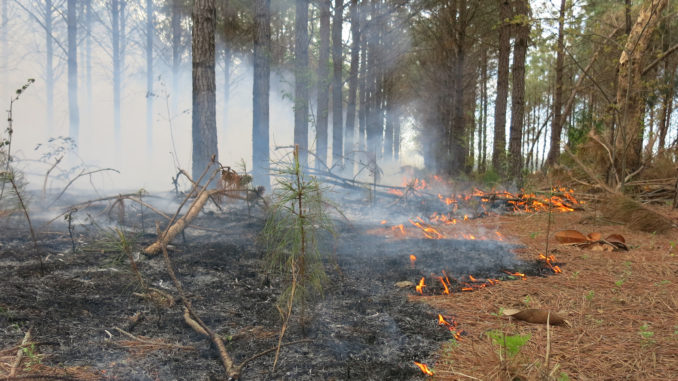
Agency says controlled burns not detrimental to wild turkeys
Plenty of hunters across South Carolina and the southeast will readily attest that turkey numbers seem to have dropped appreciably — and in some areas dramatically — and while biologists are scrambling to get a grasp on the overall situation, the dearth of turkeys has some hunters particularly unhappy.
But this past season, controlled burns taking place in South Carolina’s two national forests, the Francis Marion and Sumter, had hunters really heated up.
Darrin Dawkins, a noted call-maker who does most of his hunting in the Leeds/Carlisle/Whitmire region of the Sumter National Forest, said it was frustrating to go to an area during the March 20-May 5 statewide season, only to find a controlled burn scheduled or logs still smoldering from one that had just taken place.
“That has to be destroying nests,” said Dawkins, who mentioned the frustration of two hunters from Illinois who bought non-resident licenses, made travel plans and were ready for a lengthy hunt in the Sumter National Forest, only to show up at their first stop and have an employee of the U.S. Forest Service tell them, “You can’t hunt here today. We are going to be doing a controlled burn, dropping accelerants from the air.”
When contacted about controlled burning, James Anderson of the U.S. Forest Service replied by quoting a 2011 document written by a USFS colleague, Gary O. Burger, who wrote that the belief “that prescribed burning in March or April is detrimental to wild turkey and quail populations” is a “misconception”, suggesting that without burns, more areas would be subject to spring and summer fires due to lightning strikes.
“The improvement in forest health far outweighs any minor impact on ground nesting birds,” Burger wrote. “Most hen turkeys will simply re-nest.”
However, there doesn’t appear to be much research supporting the USFS viewpoint.
Dr. James Earl Kennamer of the National Wild Turkey Federation said one study in Louisiana indicated that turkey hens regularly re-nest after burning destroyed their eggs. He and Charles Ruth, the wild-turkey project leader for the S.C. Department of Natural Resources, were generally supportive of in-season burning, but both had reservations about single burns that encompass a lot of acreage. Ruth said SCDNR is conducting a study at its Webb Center WMA that might provide more inside.



Be the first to comment